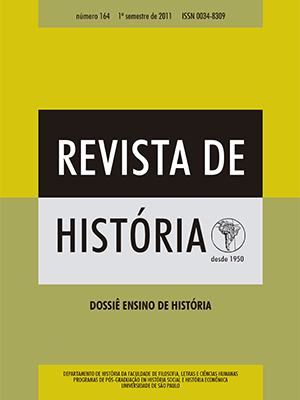Retention, reinvention and remembering: restoring identities through enslavement in africa and under slavery in Brazil
DOI:
https://doi.org/10.11606/issn.2316-9141.v0i164p17-64Keywords:
Africa identities, Portuguese America/Brazil, Slave communities, 17th to 19th centuriesAbstract
The article porposes a creative, and "speculative" reading of the experiences of Africans who, by their enslavement, connected África to Ámerica, and Ámerica to África, during the Atlantic slave trade. Engaging the historiography of slavery in the Americas beyond the simplistic and polarized contrast debated between supporters of "africanismos" and proponents of "crioulização". Trying to understand slavery as it was conceived by Africans themselves and their descendants and a historical process rather than an abstract "institution". Miller shows that the enslaved searched for social ties and built new communities as means of neutralizing the dispersion, violence and isolation of their enslavement. In the other words, re-established many senses of belonging and personal security. From religious confraternities and refugiee communities , to capoeira maltas congos "kings", and mutual associations, from the formative years of Brazilian society (16th to 17th centuries), on through the 18th century, and into politically independent 19th-century Brazil, this article proposes complex process of forming connections that, according to Miller , can be ready only through a historical perspective and by understanding themes in different context and moments of the slave society and their multiple connections with Africa .
Downloads
Downloads
Published
Issue
Section
License
Autores que publicam nesta revista concordam com os seguintes termos:
- Autores mantém os direitos autorais e concedem à revista o direito de primeira publicação, com o trabalho simultaneamente licenciado sob a https://creativecommons.org/licenses/by/4.0/ (CC BY). Esta licença permite que outros distribuam, remixem, adaptem e criem a partir do seu trabalho, mesmo para fins comerciais, desde que lhe atribuam o devido crédito pela criação original. É a licença mais flexível de todas as licenças disponíveis. É recomendada para maximizar a disseminação e uso dos materiais licenciados.
- Autores têm autorização para assumir contratos adicionais separadamente, para distribuição não-exclusiva da versão do trabalho publicada nesta revista (ex.: publicar em repositório institucional ou como capítulo de livro), com reconhecimento de autoria e publicação inicial nesta revista.
- Autores têm permissão e são estimulados a publicar e distribuir seu trabalho online (ex.: em repositórios institucionais ou na sua página pessoal) a qualquer ponto antes ou durante o processo editorial, já que isso pode gerar alterações produtivas, bem como aumentar o impacto e a citação do trabalho publicado (veja O Efeito do Acesso Livre).







